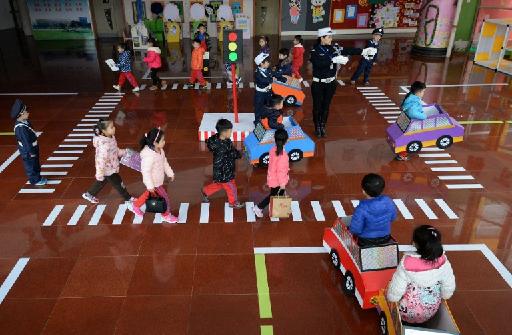As Wednesday marks the start of a new school year, the last few days of the holidays should be used to prepare children for the journey to school, as 1,510 of them were injured in a traffic accident on this route in 2020, according to the Vias Road Safety Institute.
Even though the coronavirus saw partial or total school closures, as well as extended holidays in 2020, the balance sheet remains high: 12 children were involved in an accident on the way to school every day - as many accidents per school day as other years, Vias pointed out on Monday.
"These statistics may be frightening, but it is still important to encourage children to go to school alone," the institute added.
"Being active on the way to school is excellent for children's autonomy, health and concentration," said Elke Van den Brandt, Brussels Minister for Mobility and Road Safety.
In the meantime, Brussels Mobility, in collaboration with the police zones, is also launching Opération Cartable, its annual awareness-raising campaign aimed at Brussels pupils, parents and teachers.
Related News
- Brussels transforms part of Avenue Louise into bicycle street
- Brussels drops two places on Safe Cities Index
On the campaign's website, children have access to animated tips and interactive educational games on the different modes of transport.
Teachers and parents can draw on educational sheets (on the main road signs encountered, for example) and tips to raise awareness of road safety for children on foot, by bike and on public transport.
Additionally, Vias stressed that, according to studies, children are not able to master all traffic situations before the age of 8-9.
"It is therefore best not to overestimate your child's abilities," the centre said, adding that other factors, such as the intensity of the traffic, the child's maturity or their experience in traffic also play a role.
Furthermore, the best route to school is not necessarily the fastest, which is why it is best to study the route in advance, practise with your child, and leave on time so that children do not have to rush because of time pressure.
While this seems like an obvious recommendation for young children, it also applies to teenagers, Vias stressed.
Teenagers are more likely to take risks because of puberty. Between the ages of 15 and 16, boys and girls in school are on average 52% more likely to be injured in an accident.
"It is often at 16 that young people start to use new modes of transport, such as scooters," said Vias. "As a parent, make them understand that you expect them to be respectful of the rules of the road."
All age groups combined, the risk is highest among 17-year-old boys (198 victims per 100,000 inhabitants, double the number for 12-year-olds and five times higher than for 10-year-olds).
Last year, in Brussels, 59% of victims of traffic accidents were walking to school. In Wallonia, 37% were on foot and 33% in a car. In Flanders, 56% of all victims were on bicycles, according to figures from the Vias Institute.
The Brussels Times

